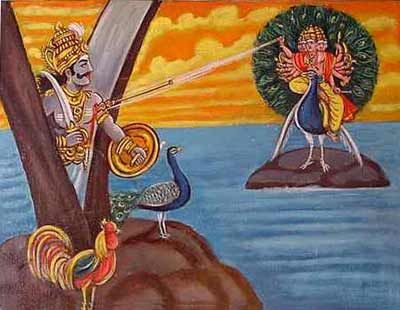SURASAMHARAM
Surasamharam (slaying of demon) is a significant event that occurs on the sixth day of the Kanda Shashti festival, which is dedicated to Lord Muruga. This event symbolizes the conclusion of a six-day battle between Lord Muruga and the demon Surapadman, ultimately resulting in the triumph of good over evil. The enactment of Surasamharam festival is celebrated across Murugan Temples around the globe on this day.
The legend behind Surasamharam is deeply rooted in Hindu mythology. According to the belief, Surapadman was a formidable demon who had acquired immense power through rigorous penance. His increasing arrogance and misuse of his powers led to havoc and unrest in the celestial realms. In response, Lord Shiva, created Lord Muruga through his third eye (wisdom), to put an end to Surapadman’s tyranny and restore cosmic balance.
The battle between Muruga and Surapadman lasted for six days, during which the demon unleashed various forms and weapons to defeat the divine warrior. However, Muruga countered each attack with his skill and valor. On the sixth day, Muruga finally defeated Surapadman by breaking him into two halves with his divine spear called Vel. The divine spear (Vel) was presented to him by his mother Goddess Parvathi. This event is known as Suasamharam, where “Sura” refers to the demon Surapadman, and “Samharam” means destruction.
The reenactment of Suasamharam is a major highlight of the Kanda Sashti festival. In temples dedicated to Lord Muruga, a symbolic representation or effigy of Surapadman is created. The climax of the event involves the portrayal of the epic battle, with performers depicting Muruga’s valor and the eventual defeat of the demon. This dramatization is often accompanied by elaborate rituals and vedic hymns with devotional fervor.
Lord Muruga’s weapon, the Vel (spear), is a symbol of spiritual knowledge and wisdom. The Vel is used to defeat Surapadman, signifying the power of divine knowledge to destroy ignorance and dispel darkness. The philosophy here is that spiritual wisdom is the key to overcome the challenges of life.
Devotees believe that witnessing or participating in the Surasamharam reenactment brings spiritual merit and blessings. It is considered an auspicious occasion that symbolizes the eradication of inner demons and obstacles in one’s life.
Surasamharam, as a festival, brings people from different backgrounds together in a collective celebration, emphasizing the unity that underlies the apparent diversity. After the victorious battle, Lord Muruga is worshipped with fervor, and the festival concludes with various religious ceremonies and rituals.

The core philosophy behind Surasamharam encompasses the victory of good over evil, the internal struggle for spiritual progress, the destruction of ego and ignorance, the importance of courage and devotion, and the seeking of divine grace for protection and guidance on the path to self-realization.
உருவாய் அருவாய் உளதாய் இலதாய்
மருவாய் மலராய் மணியாய் ஒளியாய்க்
கருவாய் உயிராய் கதியாய் விதியாய்க்
குருவாய் வருவாய் அருள்வாய் குகனே!
Rough translation of the above Kandhar Anubhuti Verse:
As form and formless, As presence and absence,
As fragrance and flower, As gem and radiance,
As nucleus and life, As liberator and destiny,
As a guru, Guha cometh to bestow thy grace!

Very lucid explanation of the background, principle and philosophy of Surasamharam. Until today, I never understood the meaning of Uruvai Aruvai. Thank you Sekar
Very nice. Enjoyed
Very nicely articulated!